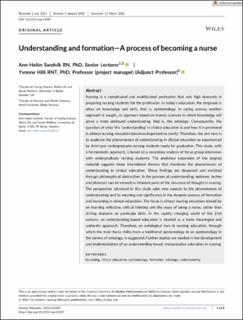| dc.contributor.author | Sandvik, Ann-Helén | |
| dc.contributor.author | Hilli, Yvonne | |
| dc.date.accessioned | 2022-06-17T13:09:30Z | |
| dc.date.available | 2022-06-17T13:09:30Z | |
| dc.date.created | 2022-03-25T08:07:11Z | |
| dc.date.issued | 2022 | |
| dc.identifier.citation | Sandvik, A.‐H. & Hilli, Y. (2022). Understanding and formation—a process of becoming a nurse. Nursing Philosophy, e12387. doi: | en_US |
| dc.identifier.issn | 1466-769X | |
| dc.identifier.uri | https://hdl.handle.net/11250/2999349 | |
| dc.description.abstract | Nursing is a complicated and multifaceted profession that sets high demands in preparing nursing students for the profession. In today's education, the emphasis is often on knowledge and skills, that is, epistemology. In caring science another approach is sought, an approach based on human sciences in which knowledge will serve a more profound understanding, that is, the ontology. Consequently, the question of what this ‘understanding’ in clinical education is and how it is promoted in clinical nursing education becomes important to clarify. Therefore, the aim here is to explicate the phenomenon of understanding in clinical education as experienced by third‐year undergraduate nursing students ready for graduation. This study, with a hermeneutic approach, is based on a secondary analysis of focus group interviews with undergraduate nursing students. The analytical expansion of the original material suggests three interrelated themes that illuminate the phenomenon of understanding in clinical education. These findings are deepened and enriched through philosophical abstraction. In the process of understanding, episteme, techne and phronesis can be viewed as inherent parts of the structure of thought in nursing. The perspective advanced in this study adds new aspects to the phenomenon of understanding and its meaning and significance in the dynamic process of formation and becoming in clinical education. The focus in clinical nursing education should be on learning reflective, critical thinking and the ways of being a nurse, rather than drilling students on particular skills. In the rapidly changing world of the 21st century, an understanding‐based education is needed as a more meaningful and authentic approach. Therefore, an ontological turn in nursing education, through which the main focus shifts from a traditional epistemology to an epistemology in the service of ontology, is suggested. Further studies are needed in the development and implementation of an understanding‐based, interpretative education in nursing. | en_US |
| dc.language.iso | eng | en_US |
| dc.publisher | Wiley | en_US |
| dc.relation.uri | https://onlinelibrary.wiley.com/doi/epdf/10.1111/nup.12387 | |
| dc.rights | Attribution-NonCommercial-NoDerivatives 4.0 Internasjonal | * |
| dc.rights.uri | http://creativecommons.org/licenses/by-nc-nd/4.0/deed.no | * |
| dc.title | Understanding and formation—A process of becoming a nurse | en_US |
| dc.type | Peer reviewed | en_US |
| dc.type | Journal article | en_US |
| dc.description.version | publishedVersion | en_US |
| dc.rights.holder | © 2022 The Authors | en_US |
| dc.subject.nsi | VDP::Humaniora: 000::Filosofiske fag: 160::Andre filosofiske fag: 169 | en_US |
| dc.subject.nsi | VDP::Medisinske Fag: 700::Helsefag: 800::Sykepleievitenskap: 808 | en_US |
| dc.source.pagenumber | 8 | en_US |
| dc.source.volume | e12387 | en_US |
| dc.source.journal | Nursing Philosophy | en_US |
| dc.identifier.doi | 10.1111/nup.12387 | |
| dc.identifier.cristin | 2012430 | |
| dc.source.articlenumber | e12387 | en_US |

